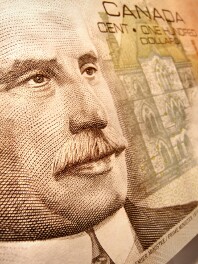The Canadian dollar surged against the British pound and the US dollar on Friday in the wake of a fresh reading for Canadian inflation, which showed that it had improved in July from a year earlier. The Canadian currency also rose against the US dollar and other major peers as investors became more optimistic that the Bank of Canada may increase its interest rates soon.
Statistics Canada said in a press release today that the consumer price index rose 1.2% on a yearly basis in July after rising 1.0% in June, which was the lowest level in 20 months. The reading matched analyst forecasts and improved the outlook for higher interest rates from the Bank of Canada before the end of the year.
Six out of eight subindexes rose over the 12 months to July, with the transportation and shelter subindexes leading the gains. Transportation costs increased 1.9% in July on a yearly basis from 0.6% in June, while shelter costs rose 1.3% last month from 1.6% the month before. Food prices also increased, along with higher costs for health and personal care.
Todayâs release added that core consumer prices increased 0.2% in July on a seasonally adjusted monthly basis following no gains in June. The increase stemmed from higher prices of food and alcohol and increased costs for healthcare, clothing, and footwear. In the year to July, core consumer prices increased 0.9%, unchanged from June. Excluding food and energy prices, prices rose 1.5% over the year leading to July from 1.4% in the previous month. Energy prices had a yearly gain of 0.3%, but lost 0.6% on a monthly basis.
Investors were relieved that todayâs reading was not lower than expected, which may support the case for an interest rate hike from the Bank of Canada to build on its July rate increase, which was the first in 7 years. However, the central bank cited in July the need for a more thorough look into economic conditions before taking another move, adding that it will await further economic data.
The Bank of Canada holds its inflation target at 2%, while the CPI common, which is the preferred index by the central bank to measure the economyâs performance, had a yearly reading of 1.4%.
GBP/CAD dropped to 1.6168 as of 17:05 GMT on Friday after touching 1.6135 at 15:50 GMT, a level last seen on January 20. GBP/CAD began the day at 1.6320. USD/CAD fell to 1.2570 after reaching 1.2561 at 16:50 GMT, the pairâs lowest level since August 4. USD/CAD started trading today at 1.2682.
If you have any questions, comments or opinions regarding the Canadian Dollar,
feel free to post them using the commentary form below.
